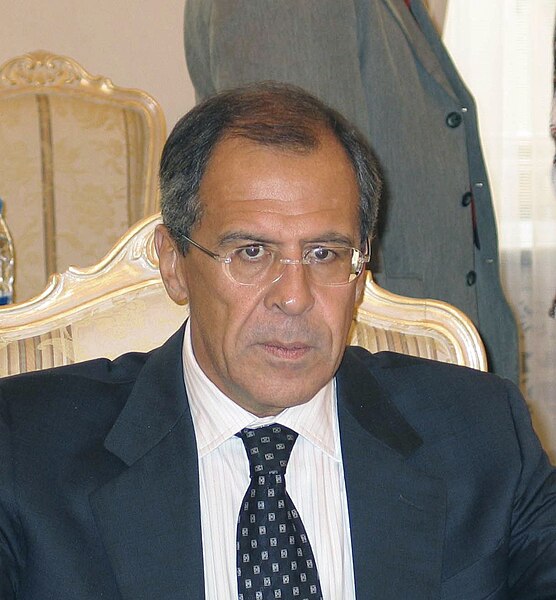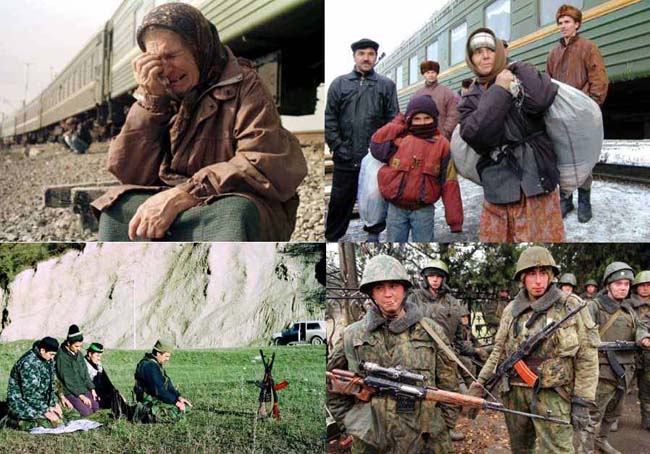Re: The Rise of the Russian Empire: Russo-Armenian Relations
Russia Resumes Patrols by Nuclear Bombers

(Tu-160 and Tu-95 Strategic bombers in flight over Russia)
New York Times by By ANDREW E. KRAMER
President Vladimir V. Putin said Friday that the Russian Air Force would resume regular, long-range patrols by nuclear-capable bombers over the world’s oceans, renewing the practice after a 15-year hiatus in another sign of Russia’s growing assertiveness. In the first flight, 14 bombers and six supporting airplanes took off at midnight on Friday, Mr. Putin said, in remarks carried on state television. Mr. Putin said such patrols would continue “from this day on.”
The sortie on Friday included Tu-160 and Tu-95 airplanes, known by their NATO appellations as Blackjacks and Bears, according to a statement posted on the Russian Defense Ministry Web site. The Russian bombers were flying Friday over the Atlantic and Pacific Oceans and the North Pole, and were being escorted by NATO fighter jets, the site said, recalling cold war-era standoffs. After the fall of the Soviet Union, Russia would periodically send its aging bomber fleet on missions, but only during major military training exercises; the country was too poor to fly the planes often.
That is no longer the case. Now the bombers, capable of carrying nuclear weapons, will regularly fly missions far from Russian soil separately from scheduled training exercises. Mr. Putin suggested Friday that the decision was a response to military threats to Russia. This month, Russian bombers flew near the American military base on the Pacific island of Guam. Gen. Pavel V. Androsov, the commander of long-range aviation, boasted that the sortie prompted the United States to scramble fighter jets that flew so close to the Russians that the pilots, “smiled at each other and then peacefully went their separate ways.” The Pentagon confirmed that Russian airplanes had been spotted but said that no fighter jets had been sent to intercept them.
In July, Russian Tu-95 bombers flew toward Scotland but turned back before entering British airspace. In that case, the Royal Air Force confirmed it had scrambled fighter jets in response. The American the response on Friday was muted. “Militaries around the world engage in a variety of different activities,” Gordon D. Johndroe, the White House spokesman, told reporters in Crawford, Tex., according to a transcript. “It’s not entirely surprising that the Russian Air Force, the Russian military, might engage in this kind of activity.”
Russian television showed images of sleek bombers soaring into the air, refueling and landing, though it was unclear whether the images depicted the sorties that took off Friday. Russia has 79 strategic aircraft, capable of carrying 900 cruise missiles, Russian television reported, far fewer than at the height of the cold war. Still, the resumption of bomber flights was the latest in a series of assertive gestures by Russia, emboldened by windfall petroleum wealth and angered over what it has called American and NATO aggressiveness, including plans for a missile-defense system in the Czech Republic and Poland, analysts said.
Earlier this year, Russia backed out of a major arms pact, the Conventional Armed Forces in Europe Treaty, and defied British demands to extradite the principal suspect in the radiation poisoning of a Russian security service defector in London. “They believe, with some legitimacy, that they are a rising power,” Cliff Kupchan, a Russia expert at the Eurasia Group in Washington, a political risk advisory and consulting firm, said in a telephone interview. “Until they feel they are playing their due role in international relations, we will continue to see assertive behavior from Russia.” “It’s a symbolic gesture, but it stands for something very real, which is a resurgent Russia,” he said of the resumption of strategic bomber patrols.
Source: http://www.nytimes.com/2007/08/18/wo...russia.html?hp
Russia Resumes Patrols by Nuclear Bombers

(Tu-160 and Tu-95 Strategic bombers in flight over Russia)
New York Times by By ANDREW E. KRAMER
President Vladimir V. Putin said Friday that the Russian Air Force would resume regular, long-range patrols by nuclear-capable bombers over the world’s oceans, renewing the practice after a 15-year hiatus in another sign of Russia’s growing assertiveness. In the first flight, 14 bombers and six supporting airplanes took off at midnight on Friday, Mr. Putin said, in remarks carried on state television. Mr. Putin said such patrols would continue “from this day on.”
The sortie on Friday included Tu-160 and Tu-95 airplanes, known by their NATO appellations as Blackjacks and Bears, according to a statement posted on the Russian Defense Ministry Web site. The Russian bombers were flying Friday over the Atlantic and Pacific Oceans and the North Pole, and were being escorted by NATO fighter jets, the site said, recalling cold war-era standoffs. After the fall of the Soviet Union, Russia would periodically send its aging bomber fleet on missions, but only during major military training exercises; the country was too poor to fly the planes often.
That is no longer the case. Now the bombers, capable of carrying nuclear weapons, will regularly fly missions far from Russian soil separately from scheduled training exercises. Mr. Putin suggested Friday that the decision was a response to military threats to Russia. This month, Russian bombers flew near the American military base on the Pacific island of Guam. Gen. Pavel V. Androsov, the commander of long-range aviation, boasted that the sortie prompted the United States to scramble fighter jets that flew so close to the Russians that the pilots, “smiled at each other and then peacefully went their separate ways.” The Pentagon confirmed that Russian airplanes had been spotted but said that no fighter jets had been sent to intercept them.
In July, Russian Tu-95 bombers flew toward Scotland but turned back before entering British airspace. In that case, the Royal Air Force confirmed it had scrambled fighter jets in response. The American the response on Friday was muted. “Militaries around the world engage in a variety of different activities,” Gordon D. Johndroe, the White House spokesman, told reporters in Crawford, Tex., according to a transcript. “It’s not entirely surprising that the Russian Air Force, the Russian military, might engage in this kind of activity.”
Russian television showed images of sleek bombers soaring into the air, refueling and landing, though it was unclear whether the images depicted the sorties that took off Friday. Russia has 79 strategic aircraft, capable of carrying 900 cruise missiles, Russian television reported, far fewer than at the height of the cold war. Still, the resumption of bomber flights was the latest in a series of assertive gestures by Russia, emboldened by windfall petroleum wealth and angered over what it has called American and NATO aggressiveness, including plans for a missile-defense system in the Czech Republic and Poland, analysts said.
Earlier this year, Russia backed out of a major arms pact, the Conventional Armed Forces in Europe Treaty, and defied British demands to extradite the principal suspect in the radiation poisoning of a Russian security service defector in London. “They believe, with some legitimacy, that they are a rising power,” Cliff Kupchan, a Russia expert at the Eurasia Group in Washington, a political risk advisory and consulting firm, said in a telephone interview. “Until they feel they are playing their due role in international relations, we will continue to see assertive behavior from Russia.” “It’s a symbolic gesture, but it stands for something very real, which is a resurgent Russia,” he said of the resumption of strategic bomber patrols.
Source: http://www.nytimes.com/2007/08/18/wo...russia.html?hp
















Comment